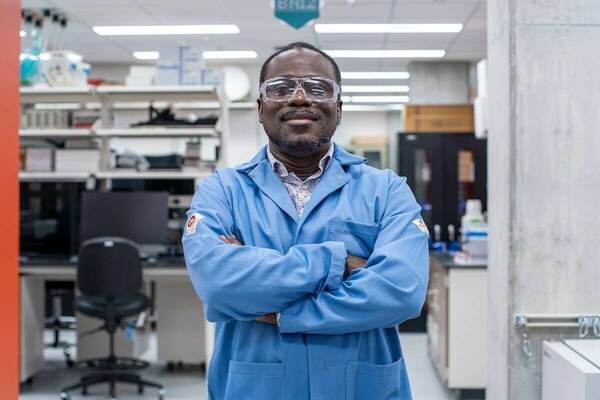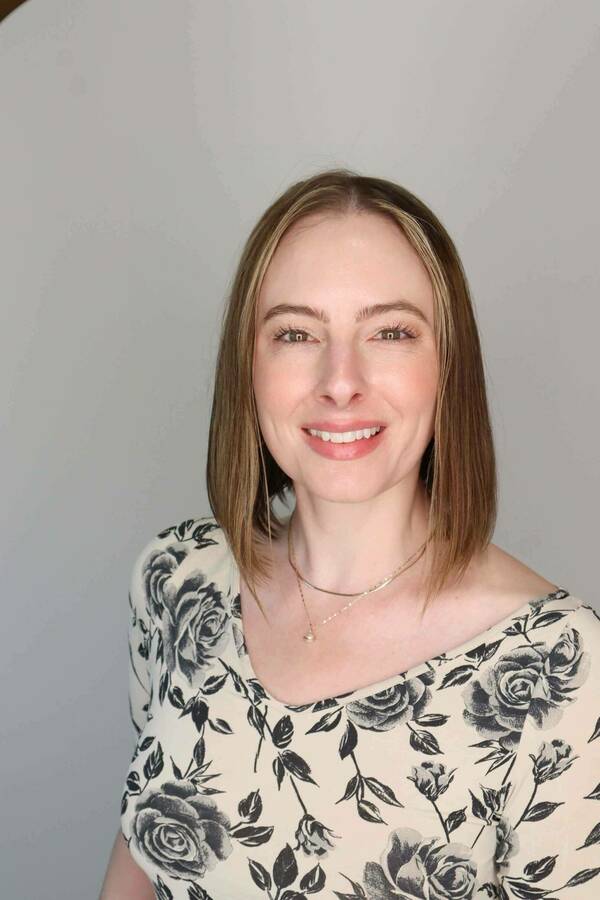Putting 10 pounds in a five-pound bag: a graduating senior reflects on majoring in global affairs

Growing up, my parents would often say to me: “You’re trying to put 10 pounds in a five-pound bag, or on some days, you’re trying to put 50 pounds in a 10-pound bag.” This has been a common theme for me over the years, and it is something I still carry with me in college. Perhaps most obviously, it is evident in my backpack: a navy blue, jam-packed Adidas bag that probably weighs anywhere from 10 to 25 pounds on a given day. In addition to the normal school supplies, I like to be prepared for whatever might come my way and have just about anything someone might need.
Like many Notre Dame students, I structure my days a little bit like my backpack, trying to shove in as much as is physically possible. This approach has allowed me to make the very most of the past four years, but it has also led me to either be right on time or a little bit late to just about everything I have attended. Needless to say, I have mastered the speed walk across campus, and can get to Jenkins Nanovic Halls from the Main Circle in about four minutes. It simply feels as though there is never enough time or space in a day to fit everything I had hoped to do.
But, you might be wondering, what does this have to do with global affairs? Well, before coming to the Keough School, I used to think about the world in this way, though even more extreme: “There are 100 pounds of work that needs to be done, and only a five-pound bag available.” In other words, there is such a great amount of work to be done, and only so much we can do. I imagine others feel similarly sometimes, especially recently when on some days it seems that the “bag” is only becoming smaller, while the workload grows ever larger.
And yet, the great benefit and beauty of learning from and with those who study and work in global affairs is that they haven’t given up hope. Many global affairs students, in particular, have been accused of being eternally optimistic; after all, those in global affairs choose the major in the first place because they have a dream of making a difference in the world. For those committed to making the world a better place, these past few months have held great challenges, change, and a fair amount of uncertainty. This brings me to the first lesson I have learned at the Keough School: Embrace the ambiguity.
Now, I’m not necessarily saying everything is automatically alright when situations arise unexpectedly or don’t go according to plan. As a member of the first undergraduate class of the Keough School of Global Affairs, I have learned that it is okay to not always see the end destination, but to still take the next step, knowing that you’re headed in the right direction.

When I transferred into the Keough School as a sophomore, having been a by-the-book mathematics and economics major, I was bombarded with the unfamiliarity, subjectivity and seemingly unstructured style of my new school. Looking back now as a senior, I am full of gratitude for my global affairs education, which has allowed me to tackle complex challenges through a combination of quantitative and qualitative perspectives, almost none of which have been straightforward and almost all of which has been continuously shifting and evolving.
As I near graduation, I have often been asked: “What is your five-year plan?” Though I am by no means certain of where I’ll be in a couple years, let alone five, I do have a clear idea of what I want to do, and why. Global affairs has instilled in me a willingness to be more flexible, and not quite as linear. Furthermore, it has pushed me to approach issues from angles I did not anticipate, and encouraged me to view challenges from a multiplicity of perspectives. Though the process can sometimes be trying, I have come out better because of it, and I will be forever grateful to Keough for pushing me to take a non-linear path.
The second insight I will take from the Keough School is the power of experiences. I’ve had several people ask me recently: “What did you write your thesis on?” To this, I respond, “Well, I actually didn’t write a thesis.” Though I am met at first with inquisitive looks and confusion, I love explaining my global affairs capstone project, and the experience and real-world skills that I will take with me from my senior year. To fulfill my capstone requirement, I completed a team-based policy project, in which I worked with the organization Education Bridge to develop programming and support for alumni of Greenbelt Academies in South Sudan.

My team and I interviewed several alumni about the support they wished for, and what they believed would be most beneficial for their transition from secondary school to a career. Every person we interviewed also shared inspiring stories of their success, and accompanied us throughout the process of the project. My team and I compiled their stories into an alumni narrative catalog, which we then used to put together a compelling funding proposal and pitch deck to create an alumni program. The opportunity to participate in a project like this was incredible, not only because of the direct interactions we had with alumni and our clients, but also because of the communication and collaboration skills that my team developed throughout the course of the semester. The real-world work experiences and skill sets that the Keough School has helped me to cultivate will be invaluable throughout the rest of my life.
The third and greatest gift that the Keough School has given me is the community of professors, fellow students and mentors who have supported me and walked with me throughout my time at Notre Dame. Last week I was asked what the highlight of my Notre Dame experience has been. After thinking for a second, I knew for certain that the highlight of Notre Dame, and my time at the Keough School has been, and always will be, the people who have supported and encouraged me to get the very most out of my time at Notre Dame, to take what I have learned, and to then give it to and share it with others.
The Keough School community has instilled in me a collaborative and creative mindset, and encouraged me to keep going in the midst of challenges and setbacks. My professors, in particular, have pushed me to approach problems from an asset-based perspective, identifying what is going well already and building upon that, rather than solely focusing on what is not working. Alongside my peers in the Keough School, I have contributed to fostering a shared sense of belonging, which embraces differences and diversity, and recognizes the fact that we will not always agree. I have learned that the act of sitting with one another, asking good questions, and truly listening to people is perhaps the single most powerful gift we can give one another.
Finally, the Keough School’s focus on the concept of integral human development has taught me to see the world through a human-centered lens, one which embraces the whole person, and recognizes their inherent dignity and worth. I have learned how to uplift and accompany communities at Notre Dame, in South Bend, and far beyond the boundaries of Our Lady’s campus.

Rather than think of the world in inherently limited terms, global affairs has helped me to see the opportunity that exists, and to hold on to hope. Regardless of the challenges, change, and uncertainty that I will inevitably encounter as I leave Notre Dame, I walk away with a sense of optimism that I am capable of making the world just a little bit – or perhaps a lot – better. I am not only armed with a sense of responsibility, but also a confidence in my capability to be a little bit of light in what can be a dark world. I trust that each of us has a bag that is big enough to help shoulder the needs of the world when coupled with our desire to make it better, and a commitment to accompany one another as we unpack one pound at a time.
Clare Cullinan will graduate from Notre Dame in May with degrees in global affairs and studio art. After graduation she will join the post-graduate service program Amate House in Chicago, where she will serve as a teacher and campus minister at Our Lady of Tepeyac High School. After her year of service, Clare plans to pursue a Ph.D.
Originally published by at keough.nd.edu on April 23, 2025.
Latest Research
- Castruccio named Fellow of American Statistical AssociationStefano Castruccio, Notre Dame Collegiate Associate Professor in the Department of Applied and Computational Mathematics and Statistics (ACMS), has been named an elected fellow of the American…
- As the Harper Cancer Research Institute’s first-ever associate director for translational research, Herman Sintim is working to turn discoveries into new tools for fighting cancerSintim brings a wealth of expertise in both basic science and entrepreneurship to his new role.
- Fall 2025 SAI Graduate Fellowship Program: Applications Open NowNotre Dame Scientific Artificial Intelligence (SAI) Graduate Fellowship The Notre Dame Scientific Artificial Intelligence (SAI) Initiative is excited to announce a semester-long Fall 2025 fellowship program for PhD students seeking to newly…
- Merlin Bruening named 2025 Outstanding Teacher in Notre Dame College of EngineeringMerlin Bruening, the Donald and Susan Rice Professor of Engineering in the Department of Chemical and Biomolecular Engineering, has won the 2025 Outstanding Teacher Award in the Notre Dame College of Engineering.
- Notre Dame Research, Athletics address challenges of ACL tears, sleep loss, and stress in new joint research projectsNotre Dame Research and Athletics have awarded three research teams the first-ever Human Performance & Wellness Research Grants. The grants will provide funding to support exceptional research projects that contribute meaningfully to fields related to the health, well-being, and performance of…
- Expanding endometriosis research: Postdoctoral researcher Ell Handy focuses on women’s healthEll Handy, a postdoctoral researcher at the University of Notre Dame with the Bioengineering Life Sciences Initiative (BELS), seeks to uncover new ways to diagnose and treat endometriosis,…












